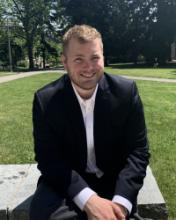This year I was the recipient of the Antoinette Wills Endowed Fund for Graduate Students, a scholarship that has provided me the opportunity in an all too difficult year to make progress in my scholarly work. Most importantly, I have developed further the second chapter of my dissertation, which delves into one of Goethe’s most famous works, Faust. First and foremost, I define Goethe’s concept of catastrophe, characterizing it as, in the words of Fritz Breithaupt, an “event-that-should-not-be” or “event-that-should-not-have happened” whose purpose is to heal the trauma affected by the crumbling of the narrative frame. However, I am quick to modify this definition in the case of Faust, taking into account its place in the tradition of world theater, whose episodic structure permits alternative readings of the catastrophic event, leading me to identify a type of event that is particular to this work: the event-that-must-be or the event-that-had-to-happen, which fulfills its own set of functions. I tie this into the socio-historical and intellectual context of Goethe’s time, using the author’s own efforts to integrate German culture into a pan-European cultural framework as a means to interpret Faust in a radically new way.
In addition to my dissertation work, I have been able to accomplish tasks on other fronts as well. At the end of last year, I was the recipient of the Gloria Flaherty Scholarship, a benefit of the Goethe Society of North America’s Dissertation Workshop, where I was able to present my first chapter and hear critical feedback from two outstanding scholars in our field, Pr. Heather Sullivan (Trinity University and UW alumna) and Pr. Daniel Purdy (Penn State University). Thanks to their excellent feedback, I have been able to improve the quality of the first chapter and, inspired by the conversation, compose an academic article which I hope to have published later this year. Furthermore, I was able to organize—along with several of my amazing graduate student colleagues—a virtual interdisciplinary graduate student conference: “Conceiving the (Un-)quiet Mind: Representations of Mental Health in Literature, Media, and Art.” The conference was a success in no small part due to the hard work of my colleagues, generous support from the Simpson Center for the Humanities, and the brilliant insights of our own Pr. Richard Block, whose keynote talk “‘He could live and love like you never could—and never will again’: The Rise and Fall of the Modern Homosexual” opened our conference on the right footing and helped to structure subsequent roundtable discussions.
The remainder of 2021 is full of exciting opportunities. I hope to complete the second chapter of my dissertation by the end of the Spring Quarter, in August I am participating in a colloquium here at the University of Washington focusing on the works of the Prussian philosopher Immanuel Kant (organized by Pr. Colin Marshall, UW Philosophy), and am presenting a paper at the German Studies Association annual conference on the topic of Heinrich von Kleist’s Das Erdbeben in Chili. I extend my deepest thanks to my dissertation chair Pr. Jason Groves for his guidance and my friend and colleague Jeff Jarzomb for his keen eye and thoughtful commentary.
